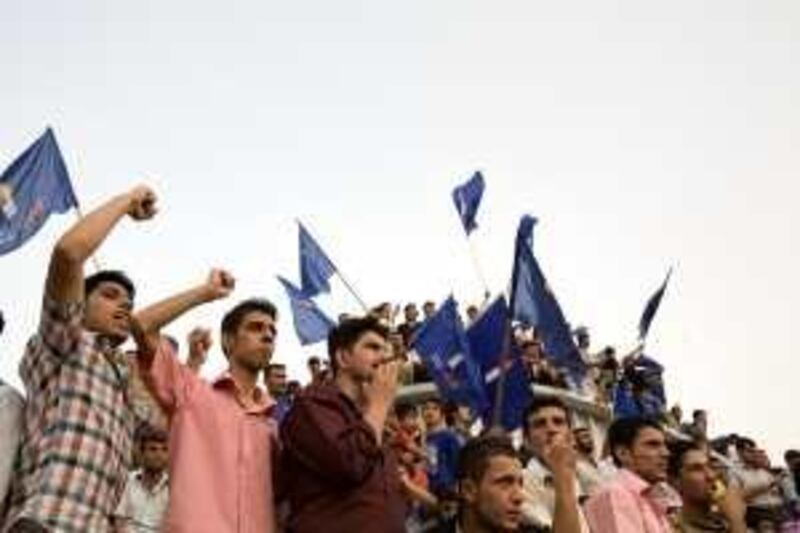ERBIL, IRAQ // A two-decade stranglehold over Iraqi Kurdistan by the Barzani and Talabani clans was officially broken yesterday, with opposition groups winning a powerful voting bloc in the regional parliament for the first time. Since 1991 the Kurdistan Democratic Party (KDP), led by Massoud Barzani, and the Patriotic Union of Kurdistan (PUK), led by Jalal Talabani, have ruled the autonomous Kurdish region of northern Iraq with impunity; controlling oil-swollen government budgets, commanding the security services and intelligence apparatus, and enjoying a lucrative hold over private sector commerce.
Yesterday Iraq's Independent High Electoral Commission announced that the Change List, an opposition group born less than six months ago by a breakaway PUK faction, won 23 per cent of the vote, enough to secure it some 25 seats in the region's 111 member parliament. Although the joint KDP/PUK list took 57 per cent of the vote, or 59 parliamentary seats - more than enough to ensure it retains control over the government - the minority bloc seized by Change, 'Goran' in Kurdish, amounts to a political earthquake for Iraq's Kurds.
Under Kurdish law, any 10 members of parliament are allowed to summon government ministers for public questioning. In the past, there were too few independent MPs for that to ever happen. Of the 111 parliamentary seats, the KDP/PUK duopoly or their well-funded allies previously held 104. In the absence of parliamentary scrutiny, corruption became rampant and the ruling elite's power grew largely unchecked, to the anger of many ordinary Kurds. While the rich and well connected enjoyed business opportunities and found jobs, those outside of the two-party system remained trapped in poverty, their low salaries increasingly outstripped by inflation.
"The political map of Kurdistan has just changed," said Diya Sliwa, general secretary of the Caldean National Congress, one of the few parties independent of KDP/PUK influence. "Parliament's job is to make laws and to keep watch on the administration but in the past there was no opposition and there was no monitoring, no scrutiny, not a thing. "Not a single government minister was called before parliament to answer questions, none of them were investigated. This new parliament will, I'm sure, be very active in monitoring everything."
Goran was not the only opposition group to win seats. The Services and Reform List, which includes the Kurdistan Islamic Union (KIU), took 12 per cent of the vote, or 13 seats. They have said they, and other smaller groups that also picked up support, may join with the Change List to form a united opposition front. If that happens, they would control about 40 parliamentary seats, laying the foundation for a rancourous parliament.
Change has promised to take an aggressive line on ministers suspected of corruption or mismanagement while the KDP has vowed to - take a hard line on dissent from within its former coalition. Mahmoud Mohammad, a senior member of the KDP's politburo and the man likely to head the party's next parliamentary group, said criticism from parties wishing to side with the governing KDP/PUK list would not be tolerated. Critics, he said, should side with the opposition, and stay outside of the government.
The IHEC also confirmed yesterday the re-election of Massoud Barzani in the presidential run-off that ran parallel to the parliamentary ballot. He took 70 per cent of the vote but actually came second in the poll to Kamal Mirawdeli, an obscure candidate, in Sulemaniya, one of the three provinces making up the Kurdish autonomous zone. Sulemaniya and south-eastern parts of Iraqi Kurdistan make up the Change List's power base, with many of its supporters drawn from the PUK. The group is led by Nawshirwan Mustafa, a wealthy entrepreneur who cofounded the PUK before falling out with Jalal Talabani, the other main leader and president of Iraq.
Rivalry between the KDP/PUK and Change has been heated. Before the final results were announced, Change reported its offices in Erbil were ransacked by KDP supporters, and there were isolated outbreaks of violence between rival supporters in Sulemaniya. In addition, allegations of serious corruption have tainted the election. Faraj al Haidari, the head of the IHEC in Kurdistan, said more than 400 complaints of fraud had been made. While pledging to investigate them all, he said the results were likely to stand. Turnout was 79 per cent.
Technically the results are only provisional because any party wishing to challenge the outcome is entitled to take legal action in Kurdish courts or in the central courts in Baghdad. Fallout from the Kurdish election could be widespread. Mr Talabani's PUK suffered heavily and is now being propped by its power sharing deal with the KDP. Without that its presence in the Kurdish parliament would be almost certainly be minimal. Some Iraqi news reports say Mr Talabani is considering whether or not he can continue as Iraq's president with such a diminished personal mandate.
Mr Talabani is viewed as a moderate figure wishing to broker a compromise between Erbil and Baghdad over disputed areas, including Kirkuk, the oil rich northern city claimed by the Kurds as part of their autonomous zone but which the central government does not want to relinquish control over. Mr Barzani is a leading advocate of bringing Kirkuk into the Kurd's administrative area. Although Iraqi Kurdistan has enjoyed a much better security situation than other parts of the country and has developed much faster, essential services such as electricity, remain limited in supply.
"We are happy if there is a strong opposition," said Diya Sliwa, of the Caldean National Congress. "It will make the two main parties review the way they conduct themselves and it will make them correct their mistakes. If there was no opposition, the KDP and PUK would carry on walking down the same path." psands@thenational.ae





